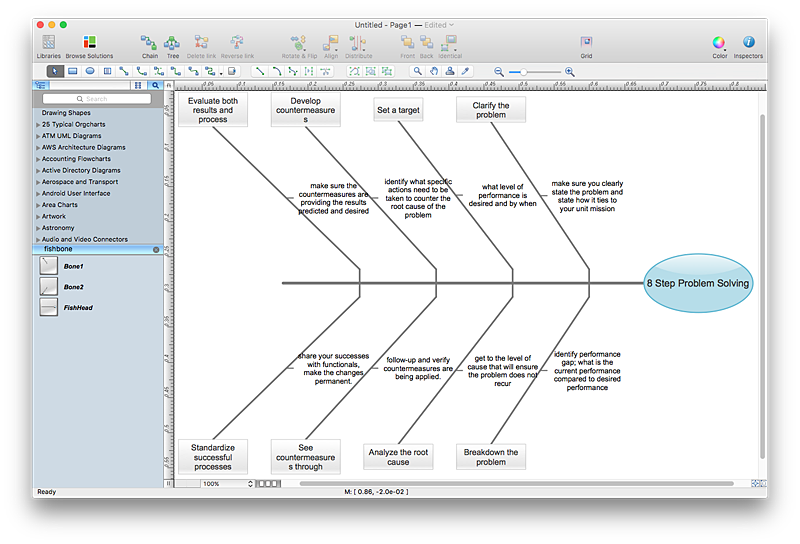HelpDesk
How to Create a Fishbone (Ishikawa) Diagram Quickly
A Fishbone (Ishikawa) diagram is also called cause-and-effect diagram. Fishbone diagram is often used in business to determine the cause of some problem. The diagram illustrates the main causes and sub-causes leading to an event. The main goal of the Fishbone diagram is to illustrate in a graphical way the relationship between a given outcome and all the factors that influence this outcome. The complete diagram resembles a fish skeleton as its name implies. The ability to create a Fishbone Diagram is supported by the Fishbone Diagram solution. Use ConceptDraw MINDMAP for structuring data and then ConceptDraw PRO for generating a Fishbone Diagram from mind map structure.
 Fishbone Diagrams
Fishbone Diagrams
The Fishbone Diagrams solution extends ConceptDraw PRO v10 software with the ability to easily draw the Fishbone Diagrams (Ishikawa Diagrams) to clearly see the cause and effect analysis and also problem solving. The vector graphic diagrams produced using this solution can be used in whitepapers, presentations, datasheets, posters, and published technical material.
 Fishbone Diagram
Fishbone Diagram
Fishbone Diagrams solution extends ConceptDraw PRO software with templates, samples and library of vector stencils for drawing the Ishikawa diagrams for cause and effect analysis.
 Seven Basic Tools of Quality
Seven Basic Tools of Quality
Manage quality control in the workplace, using fishbone diagrams, flowcharts, Pareto charts and histograms, provided by the Seven Basic Tools of Quality solution.
- Maintenance Engineering Fish Bone Diagram
- Fishbone Diagram In Maintenance Engineering
- Fishbone Diagram For Maintenance
- Ishikawa Diagram In Maintenance
- Manufacturing 8 Ms fishbone diagram - Template | Fishbone ...
- Engineering Fishbone Diagram
- Process Flowchart | Manufacturing 8 Ms fishbone diagram ...
- Fishbone Diagram | Fishbone Diagrams | Cause and Effect ...
- Maintenance And Operation Diagram
- Fishbone Diagrams | Fishbone Diagram | Ishikawa Chemical Industry
- Fishbone Diagrams | Seven Basic Tools of Quality | Pereto And ...
- ConceptDraw Solution Park | Fishbone Diagram | Manufacturing ...
- Electrical Symbols — Maintenance | Circuits and Logic Diagram ...
- SWOT and TOWS Matrix Diagrams | Fishbone Diagram ...
- Fishbone Diagram Example Engineering
- Fishbone Diagram For Electrical Engineering
- Process Flowchart | Manufacturing 8 Ms fishbone diagram ...
- Fishbone Diagrams | Fishbone Diagram | Engineering | Fishbone ...
- Ishikawa Diagram | Manufacturing 8 Ms fishbone diagram ...
